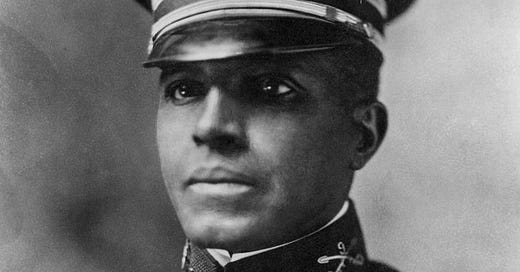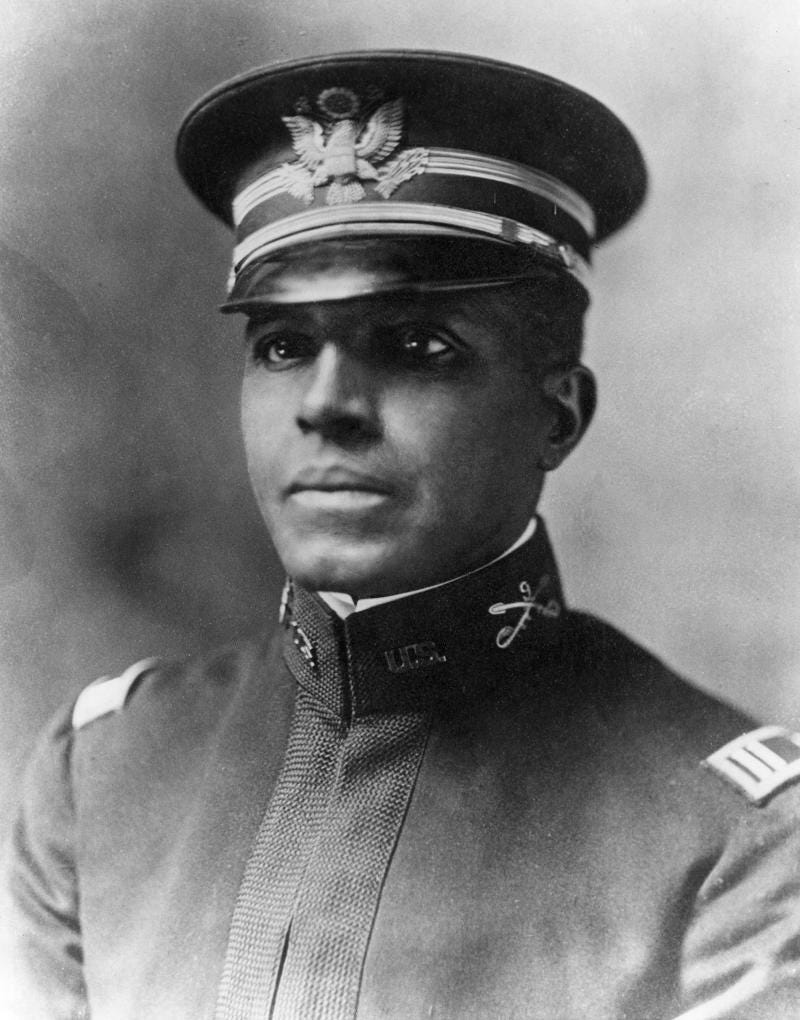Today In Black History: Brigadier General Charles Young
The 3rd Black Graduate of West Point and the first Black National Parks Superintendent
Issue #717 Today In Black History, Thursday, August 29, 2024
Did you know that you can listen to each “We Are Speaking” post on the Substack App? Download the app!
Help us to reach our August 2024 goals: +100 total new subscribers, including +35 new paid subscribers.
Please share and subscribe to help us grow our publication.
If you like us, REALLY like us, please click the “Like” button at the end of this post!
We appreciate your support!
Charles Young was born into slavery on March 12, 1864, in Mayslick, Kentucky. Shortly after the Civil War ended, his family moved to Ripley, Ohio, a center of the abolitionist movement. Young graduated from the integrated high school in Ripley and later attended the United States Military Academy at West Point.
At West Point, he faced blatant racism and constant isolation from his fellow cadets, but he successfully graduated in 1889, becoming only the third African American to do so.
Young's military career included initial assignments serving with the Buffalo Soldiers, the all-Black regiments of the U.S. Army, where he quickly rose through the ranks. He proved his leadership capabilities by effectively leading his men in various campaigns, including the Spanish-American War and the Philippine-American War. In 1916, he was promoted to Lieutenant Colonel, becoming the highest-ranking African American officer in the Army.
In 1903, Young served as captain of a Black company at the Presidio of San Francisco. He was then appointed acting superintendent of Sequoia and General Grant national parks, becoming the first Black superintendent of a national park. (At that time, the military supervised all national parks.)
Captain Young's most significant impact on the park was managing road construction, which allowed more visitors to enjoy it.
When the Army founded the Military Intelligence Department in 1904, it assigned Young as one of the first military attachés, serving in Port-au-Prince, Haiti.
Perhaps one of Young's most notable contributions was his role as a mentor and advocate for African American soldiers. His tenure as a professor at Wilberforce University and later as a military attaché in countries like Haiti and Liberia underscored his commitment to uplifting black soldiers and fostering international goodwill. He was also a torchbearer for civil rights.
While Captain Young was on a reconnaissance mission in Nigeria in late 1921, he suddenly became debilitatingly ill. Young died of a kidney infection at the British hospital in Lagos on January 8, 1922.
He was given a full military funeral and was buried at Arlington National Cemetery in Section 3 across the Potomac River from Washington, D.C. He was the fourth soldier to receive a funeral in Arlington Memorial Amphitheater.
Because of his unique Army achievements, he had become a public and respected figure, and his obituary was published in The New York Times.
One hundred years after his death, on February 15, 2022, President Joe Biden posthumously promoted Charles Young to the rank of Brigadier General in recognition of his extraordinary service and the barriers he broke.
Today In Black History
Congress passed the Civil Rights Act of 1957 in 1957, the first federal civil rights legislation since 1875. It gave the Justice Department authority to seek injunctions against voting rights infractions.
In 1962, Mal Goode became the first African American news commentator when he began broadcasting on ABC.
In 1979, the Sheridan Broadcasting Corporation purchased the Mutual Black Network, creating the first completely Black-owned radio network.
In 2005, Hurricane Katrina made its second and third landfalls as a Category 3 hurricane, killing more than 1,836 people and causing over $115B in damages.
Our paid subscribers are encouraged to discuss this post in our W.A.S. Chat Community.
Join Pamela Hilliard Owens’s subscriber chat
Available in the Substack app and on the web
You are also welcome to view “We Are Speaking” in Substack Notes. You can also read other Substack publications without subscribing to them when you join Notes.






